Natural Home Remedies for Thick Hair
By Dr Anuja Bodhare +2 more

Get,

to manage your symptom
Get your,


4 Cr+ families
benefitted

OTP sent to 9988776655



You’ve successfully subscribed to receive
doctor-approved tips on
Whatsapp

Get ready to feel your best.

Hi There,
Download the PharmEasy App now!!


Register to Avail the Offer
Send OTPBy continuing, you agree with our Privacy Policy and Terms and Conditions

Hi There,
Sign up on PharmEasy now!!
Trusted by 4 crore+ families

OTP sent to 9988776655



You have unlocked 25% off on medicines




Code: NU25
By Dr Anuja Bodhare +2 more
Table of Contents
Hair is considered as a sign of beauty and one of the first things that we notice about people. Hair plays a major role in framing one’s personality. Treated as a piece of art, a head full of thick, shiny and bouncy hair can change your look completely. On the other hand, a receding hair line and hair loss can really get you stressed!
Hair loss can occur anywhere on the body, but it most commonly affects the scalp. The scalp has around one lakh hair that are in a continuous cycle of growing, resting, falling and regeneration. Mostly people lose around 50 to 100 strands of hair per day which is natural and part of the cycle. If this cycle is disturbed or there is damage to hair follicles, it will lead to falling of greater number of hair than the number being regenerated. Hair fall can occur in various ways such as hair coming out in clumps, receding hairline and thinning of hair1,2.
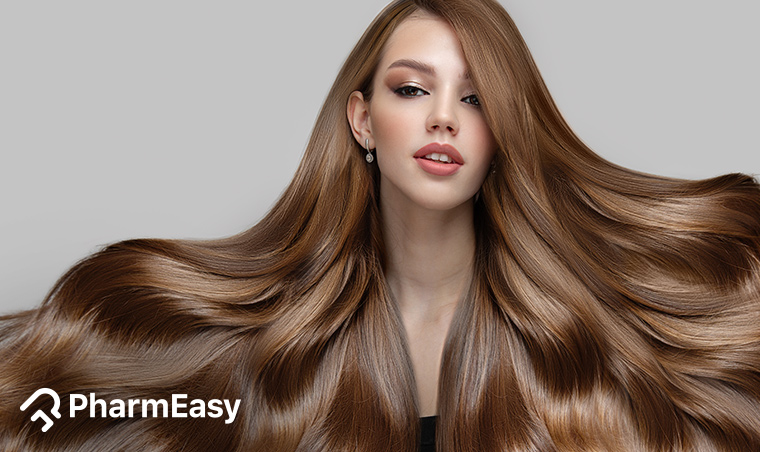
A host of reasons can cause hair fall, one or more:
It is the most common reason for hair loss affecting both men and women world-wide. Genetics do play a big role in lack of a crown of thick hair3.
Ageing leads to slowing of hair growth. At certain point in our lives, hair follicles stop growing hair, which causes thinning of hair. Hair also loses its colour too with age3.
Alopecia areata is an auto-immune disease in which body’s immune system attacks hair follicles (which hold the hair to the scalp) leading to hair loss3. This condition requires medical intervention, therefore, do not self-diagnose or take medications without proper consultation.
After a few months of giving birth, mothers may experience extensive hair fall due to a change in the hormone levels during and after pregnancy3.
Polycystic Ovarian Syndrome (PCOS) leads to the formation of cysts in the ovaries. It is accompanied by other signs and symptoms, one of the most common ones being hair loss3. Furthermore, inform your doctor if you have any history of allergy to medicines (if experienced in the past)
Alopecia means hair loss. In this condition, inflammation destroys the hair follicles. Once the hair follicles are destroyed, they can never grow hair3.
Reduced or excessive functioning of the thyroid both can lead to thinning of hair. Sometimes hair also comes out in clumps while combing or brushing the hair3.
People who have psoriasis, an auto-immune skin condition, may eventually develop psoriasis on their scalp. This can be extremely painful and leads to ample hair loss3.
Chemotherapy or radiation therapy as part of cancer treatment may lead to complete or partial loss of hair within a few weeks of treatment3.
When there is a deficiency of biotin, iron, protein or zinc nutrients, it leads to hair loss3. Lastly, hair fall can also happen due to severe side effects of certain medications or treatments.
Hair loss due to a hormone imbalance is not always permanent; in some cases, thicker hair can regrow after restoring hormonal equilibrium. However, this process may take several months or even years, depending on the severity of the imbalance and any underlying medical conditions like hypothyroidism.
Dr. M.G. Kartheeka, MBBS, MD(Pediatrics)
If you keep suffering from hair loss, you can never have thick hair4. A few people may develop other signs and symptoms along with hair loss as follows:
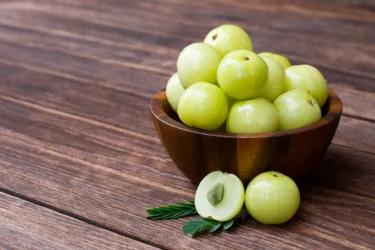
Amla or Indian gooseberry contains tons of vitamin C, and other beneficial compounds like gallic acid and quercetin. Together these provide immense nutritional support towards achieving thick tresses. Amla oil can be prepared by boiling dry amla pieces in coconut oil. It works as a wonderful hair tonic that helps in hair growth. You can also mix fresh amla juice and lime juice and apply this to prevent hair loss and increase hair growth. Together this should help obtain thick, shiny hair5.

Onion is very beneficial in treating patchy baldness. Onions contain vitamin C, allicin and sulphur containing compounds that may help stimulate hair regrowth. Rub the affected area with onion juice till it becomes red. Apply honey afterwards on the same area5.

Application of rosemary and lavender oil topically on the scalp stimulates the hair follicles. Massage with these oils daily to reduce hair loss5.

Walnut oil promotes hair growth and nourishes the hair naturally. Walnuts contain iron, copper, zinc, potassium, manganese, proteins and fats. These nutrients help overcome any nutritional deficiency and achieve thick, glossy hair. Apply walnut oil on the scalp and massage it into the roots of the hair for fighting hair loss5.
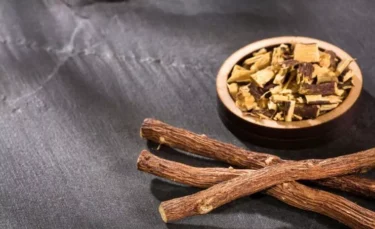
Liquorice is a very useful remedy for people dealing with patchy baldness, as it is known to help with hair growth. Chief constituents of liquorice are glycyrrhizin, potassium and calcium salt of glycyrrhizinic acid are part of. Grind the pieces of liquorice in milk and add a pinch of saffron, Make a fine paste. Now apply this paste on the bald patches before going to bed at night5.
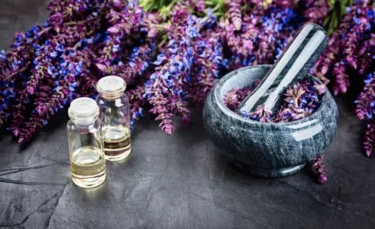
Sage helps in thickening of the hair shaft and improves blood flow to the scalp2. Mix a few drops of sage oil with a few drops of peppermint oil. Now dilute this mixture by adding olive oil. Massaging this oil mixture on the scalp may help people suffering from hair loss. Sage rinse prepare a sage and rosemary rinse by adding both the herbs in boiling water. Now rinse your hair with it to promote the thickening of hair.

Bee pollen helps in stimulating hair growth2. Mix bee pollen with hot water to make a mask and apply this hair growth mask on your hair. You can also add bee pollen directly to your shampoo to give a boost to your hair with every hair wash.
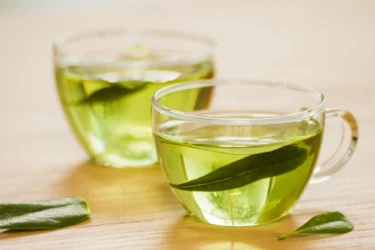
Green tea helps in decreasing hair loss and stimulates in the growth of strong and thick hair2.

Hibiscus helps in dense hair growth by improving blood flow to the scalp2. Grind a few hibiscus leaves with flowers and some fresh yoghurt to make a paste. Now apply this paste on your hair leave it for an hour. Later, rinse it off with the help of lukewarm water and a mild shampoo.
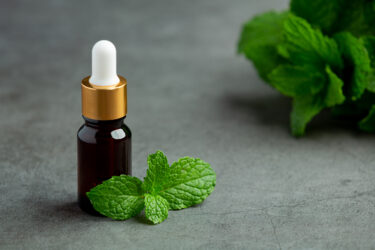
Peppermint is a very effective therapeutic agent that promotes hair health6. Massage peppermint oil directly on the scalp. Wash the hair with mild shampoo afterwards.
Refer to the doctor immediately if you notice the following:
Using the right shampoo preferably sulfate free which cleanses the scalp and the right conditioner that boosts hydration is helpful to maintain healthy and thick hair.
Dr Ashish Bajaj, M.B.B.S, M.D. in Clinical Pharmacology and Toxicology
Hair plays an important role in framing the personality and appearance of a person. It has both psychological and sociological importance. Everyone wants to have thick hair as it adds to confidence and brings that spring in the step of every girl for sure. Needless to say, hair loss is a big concern these days. Reasons for hair loss can vary from genetic, thyroid disorders, PCOS, cancer, psoriasis, nutritional deficiency, etc. But it’s important to know that you shouldn’t self-medicate, instead seek professional help. Various herbs are found to be useful in thickening of hair. Simple home remedies with amla, onion, sage, liquorice, hibiscus, green tea, walnut, rosemary, lavender, etc. are found to promote hair growth in some people.
There is no evidence to support that shaving of scalp helps in thickening of hair.
There is no study to support the role of dandruff in hair loss.
Use of herbs such as hibiscus, sage, alma, liquorice, etc. are found to be very useful in hair growth2,5.
After few months of child birth mother can experience extensive hair fall3.
Nutrients such as biotin, iron, protein, zinc, etc. helps in thickening of hair3.
Alopecia refers to the loss of hair1.
Disclaimer: The information provided here is for educational/awareness purposes only and is not intended to be a substitute for medical treatment by a healthcare professional and should not be relied upon to diagnose or treat any medical condition. The reader should consult a registered medical practitioner to determine the appropriateness of the information and before consuming any medication. PharmEasy does not provide any guarantee or warranty (express or implied) regarding the accuracy, adequacy, completeness, legality, reliability or usefulness of the information; and disclaims any liability arising thereof.
Links and product recommendations in the information provided here are advertisements of third-party products available on the website. PharmEasy does not make any representation on the accuracy or suitability of such products/services. Advertisements do not influence the editorial decisions or content. The information in this blog is subject to change without notice. The authors and administrators reserve the right to modify, add, or remove content without notification. It is your responsibility to review this disclaimer regularly for any changes.
Comments

Leave your comment...
You may also like
Comments